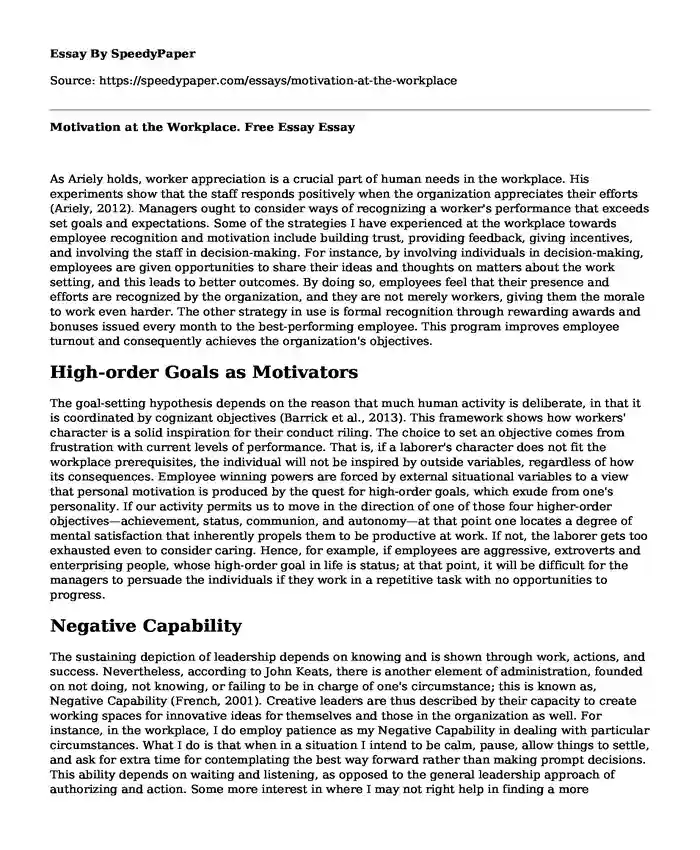
| Essay type: | Process essays |
| Categories: | Human resources Motivation Organizational behavior |
| Pages: | 3 |
| Wordcount: | 639 words |
As Ariely holds, worker appreciation is a crucial part of human needs in the workplace. His experiments show that the staff responds positively when the organization appreciates their efforts (Ariely, 2012). Managers ought to consider ways of recognizing a worker's performance that exceeds set goals and expectations. Some of the strategies I have experienced at the workplace towards employee recognition and motivation include building trust, providing feedback, giving incentives, and involving the staff in decision-making. For instance, by involving individuals in decision-making, employees are given opportunities to share their ideas and thoughts on matters about the work setting, and this leads to better outcomes. By doing so, employees feel that their presence and efforts are recognized by the organization, and they are not merely workers, giving them the morale to work even harder. The other strategy in use is formal recognition through rewarding awards and bonuses issued every month to the best-performing employee. This program improves employee turnout and consequently achieves the organization's objectives.
High-order Goals as Motivators
The goal-setting hypothesis depends on the reason that much human activity is deliberate, in that it is coordinated by cognizant objectives (Barrick et al., 2013). This framework shows how workers' character is a solid inspiration for their conduct riling. The choice to set an objective comes from frustration with current levels of performance. That is, if a laborer's character does not fit the workplace prerequisites, the individual will not be inspired by outside variables, regardless of how its consequences. Employee winning powers are forced by external situational variables to a view that personal motivation is produced by the quest for high-order goals, which exude from one's personality. If our activity permits us to move in the direction of one of those four higher-order objectives—achievement, status, communion, and autonomy—at that point one locates a degree of mental satisfaction that inherently propels them to be productive at work. If not, the laborer gets too exhausted even to consider caring. Hence, for example, if employees are aggressive, extroverts and enterprising people, whose high-order goal in life is status; at that point, it will be difficult for the managers to persuade the individuals if they work in a repetitive task with no opportunities to progress.
Negative Capability
The sustaining depiction of leadership depends on knowing and is shown through work, actions, and success. Nevertheless, according to John Keats, there is another element of administration, founded on not doing, not knowing, or failing to be in charge of one's circumstance; this is known as, Negative Capability (French, 2001). Creative leaders are thus described by their capacity to create working spaces for innovative ideas for themselves and those in the organization as well. For instance, in the workplace, I do employ patience as my Negative Capability in dealing with particular circumstances. What I do is that when in a situation I intend to be calm, pause, allow things to settle, and ask for extra time for contemplating the best way forward rather than making prompt decisions. This ability depends on waiting and listening, as opposed to the general leadership approach of authorizing and action. Some more interest in where I may not right help in finding a more ingenious way of dealing with situations that might arise in my organization. One does not need to have all the appropriate responses and be the most brilliant individual in the room. There is no offense in admitting or hesitating you do not know the answer.
References
Barrick, M. R., Mount, M. K., & Li, N. (2013). The theory of purposeful work behavior: The role of personality, higher-order goals, and job characteristics. Academy Of Management Review, 38(1), 132-153.pdf
French, R. (2001). "Negative capability": managing the confusing uncertainties of change. Journal of Organizational Change Management, 14(5), 480-492. Doi: 10.1108/eum0000000005876
Ariely, D. (2012, October). What makes us feel good about our work [Video]? TED. https://www.ted.com/talks/dan_ariely_beware_conflicts_of_interest#t-1209051
Cite this page
Motivation at the Workplace. Free Essay. (2023, Aug 11). Retrieved from https://speedypaper.net/essays/motivation-at-the-workplace
Request Removal
If you are the original author of this essay and no longer wish to have it published on the SpeedyPaper website, please click below to request its removal:
- Free Essay on How Hegemonic Masculinity Has Increased Violence Against Women in Bangladesh
- Literature Review Example on the Role of Giftedness in Solving Global Problems
- Free Essay on Employment Branding Policy that Focuses on Branding
- Essay Sample on Behavior Management
- Essay Sample on Transforming Theory to Practical Application
- Paper Example. Purpose of Cognitive or Conceptual Maps.
- Essay Example. HR Management in Focus
Popular categories




